Focus on demand creation reforms in Budget

PHD Chamber of Commerce and Industry has urged the government that demand rejuvenating reforms should be the major focus area of the forthcoming Union Budget 2020-21.
PHD Chamber of Commerce and Industry has urged the government that demand rejuvenating reforms should be the major focus area of the forthcoming Union Budget 2020-21.
Demand creation reforms will push the broad-based recovery of the economy and create an environment of enthusiasm to become a $5 trillion economy, going forward, D K Aggarwal, President, PHDCCI said
At this juncture, rationalisation of direct taxes and an income tax exemption upto the level of income of Rs 5 lakhs will be a great breakthrough to enhance the personal disposable income of the individuals and to increase the consumption demand in the economy, said Aggarwal.
With no personal income tax applicable upto the income of Rs 5 lakhs for the individuals, income tax slabs should be rationalised to 10 per cent for people earning up to Rs 10 lakhs per year, 20 per cent for those with incomes of over Rs 10 lakhs and up to Rs 20 lakhs, 30 per cent for income over Rs 20 lakhs and up to Rs 2 crore and 35 per cent for individuals earning more than Rs 2 crore, he said.
Increased expenditure of the government to enhance consumption demand along with implementation of Rs 102 lakh crore National Infrastructure Pipeline (NIP) has the potential to push economic growth trajectory to more than 8 per cent in the next three years, Aggarwal added.
Access to finance is a major roadblock being faced by the industries particularly by the MSMEs impacting their competitiveness and growth. To address the liquidity crunch in MSMEs, there is a need to set up a dedicated fund of Rs 25,000 crore or more with no collateral being asked for the MSMEs, PHDCCI has said.
Long term Capital Gains Tax on shares is suggested at 10 per cent for the holding period after one year, 5 per cent after two years and zero per cent after three years as when STT was levied it was in lieu of exempting long term capital gains tax.
Around 95 per cent of MSMEs are in Proprietorship/Partnerships business. They are not getting any relief from the recent cut in corporate tax rates. So at this juncture we suggest a uniform tax rate of 25 per cent to such businesses, going forward, Aggarwal said.
To kick-start the exports growth trajectory, the PHDCCI president suggested increase in export earnings by the exporters on the base of the previous year (year-on-year earnings) should be tax free.
MSME exporters must be fully exempted from tax on their export earnings as this will enhance the exporters' motivation and strengthen their competitiveness in the global markets.
For doubling farmers' income, a properly designed market support scheme for agricultural produce and dismantling of barriers to markets for farmers must be pursued, the chamber has suggested.
APMC should be dismantled and e-NAM should become the vehicle for farmers' produce across the states.
Aggarwal also urged for increase in public healthcare spending to at least 3 per cent of GDP with increase in annual budget each year for delivery of better health services to the people. Health centres should be made available within the radius of one kilometer and hospitals within the radius of 10 km, said Aggarwal.
There is a need to initiate work on inclusive and approachable education with a spending of at least 4.5 per cent of GDP on education, he added.
A robust analysis of current skill gaps to promote effective skill development should be undertaken to create more and more employment opportunities for the growing workforce in the country. Skill Mapping must be done to scientifically plan human resource needs in the different sectors of the economy.









